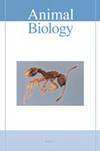石竹露地试验的大胆行为及生态适应性
IF 0.9
4区 生物学
Q2 ZOOLOGY
引用次数: 0
摘要
大胆与鱼类的适应策略和入侵能力密切相关,已成为鱼类个性研究的焦点。然而,由于缺乏对行为阶段的研究,某些行为的生态功能尚不清楚。为了更好地了解亚洲入侵鱼类石斑鱼(Pseudorasbora parva)的大胆性和入侵性之间的联系,我们将这些鱼暴露在开阔的野外环境中60分钟,并评估它们的行为模式、特征和阶段。结果表明,石首乌的大胆行为表现为高活动性、低平均速度和多样化的游泳姿势。揭示了五个具有显著差异的行为阶段:爆发、抑制、慢泳、探索和适应。这些观察结果表明,石龙子可以很快适应新的环境。此外,stone moroko在探索生活区上花费了更多的精力,而在环境风险评估上花费了更少的精力,正如对其能源权衡策略的分析所揭示的那样。stone moroko的行为策略可能解释了它们极高的环境适应性和入侵多种环境的能力。本文章由计算机程序翻译,如有差异,请以英文原文为准。
Boldness behavior and ecological adaptability of stone moroko (Pseudorasbora parva) in open-field testing
Boldness is closely related to fish species’ adaptative strategies and invasiveness and has become the focus of fish personality research. However, due to the lack of studies on behavioral stages, the ecological functions of certain behaviors remain unclear. To better understand the link between boldness and invasiveness in stone moroko (Pseudorasbora parva), an invasive Asian fish species, we exposed the fish to an open-field environment for 60 min and assessed their behavioral patterns, profiles, and stages. The results show that the boldness behavior of stone moroko was characterized by high activity, low average velocity, and diverse swimming postures. Five behavioral stages with significant differences were revealed: outbreak, inhibition, slow swimming, exploration, and adaptation. These observations suggest that stone moroko can quickly habituate to new environments. In addition, stone moroko spent more energy on exploring the living area and less on environmental risk assessment, as revealed by an analysis of their energy trade-off strategy. The behavioral strategies of stone moroko may explain their extremely high environmental adaptability and ability to invade multiple environments.
求助全文
通过发布文献求助,成功后即可免费获取论文全文。
去求助
来源期刊

Animal Biology
生物-动物学
CiteScore
2.10
自引率
0.00%
发文量
34
审稿时长
3 months
期刊介绍:
Animal Biology publishes high quality papers and focuses on integration of the various disciplines within the broad field of zoology. These disciplines include behaviour, developmental biology, ecology, endocrinology, evolutionary biology, genomics, morphology, neurobiology, physiology, systematics and theoretical biology. Purely descriptive papers will not be considered for publication.
Animal Biology is the official journal of the Royal Dutch Zoological Society since its foundation in 1872. The journal was initially called Archives Néerlandaises de Zoologie, which was changed in 1952 to Netherlands Journal of Zoology, the current name was established in 2003.
 求助内容:
求助内容: 应助结果提醒方式:
应助结果提醒方式:


